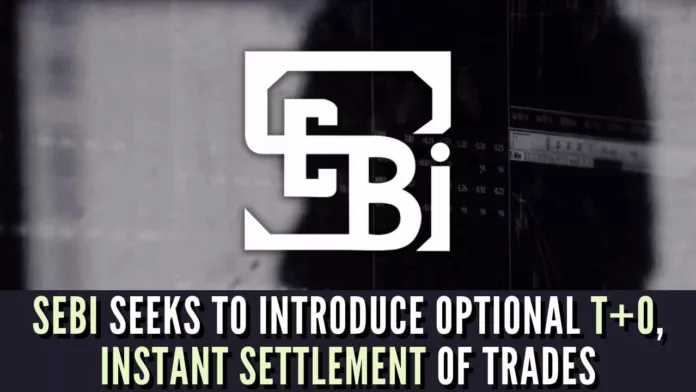
SEBI floats consultation paper, proposes same-day trade settlement on an optional basis
Market regulator Securities and Exchange Board of India (SEBI) has solicited comments and inputs from stakeholders on the introduction of the facility for clearing and settlement of funds and securities on T+0 and instant settlement cycle on an optional basis in addition to the existing T+1 settlement cycle in secondary markets for the equity cash segment.
Over the last few years, the Indian securities markets has seen tremendous growth, both in terms of volumes, value, as well as number of participants. This increase in the participation of new investors in the securities market puts a greater onus on SEBI to make markets more efficient and safer for its participants, with a special focus on retail participants, a SEBI consultation paper said.
SEBI, in its endeavour to keep pace with the changing times and carry out its mandate of development of securities markets and investor protection, shortening the settlement cycle to T+3 from T+5 in 2002 and subsequently to T+2 in 2003. Further in 2021, T+1 settlement was introduced in a phased manner which was fully implemented from January 2023.
It is observed that a high percentage of retail investors bring upfront funds and securities before placing an order. For the period June 2023, for around 94% of delivery-based trades with a value up to Rs.1, 00,000 per transaction, investors made early pay–in of funds and securities.
An instant settlement mechanism enables instant receipt of funds and securities, vis-a-vis existing pay-out on T+1 day, eliminating the risk of settlement shortages since both funds and securities will be required to be available before placing the order.
This also eliminates the risk for market participants and reduces the risk exposure of Clearing Corporations (CCs). Strengthens investor protection by enhancing the control of the investor over the securities and funds as funds and securities would be credited into the clients’ account directly for those who are trading through blocked amounts using the UPI facility (UPI Clients).
[With Inputs from IANS]
For all the latest updates, download PGurus App.
- Myanmar authorities seize 100 Kg methamphetamine, 13 kg of ketamine in southern region - April 28, 2024
- Centre permits export of 99,150 tonnes of onion to 6 countries - April 28, 2024
- Delhi Congress chief resigns, cites party’s alliance with AAP - April 28, 2024










